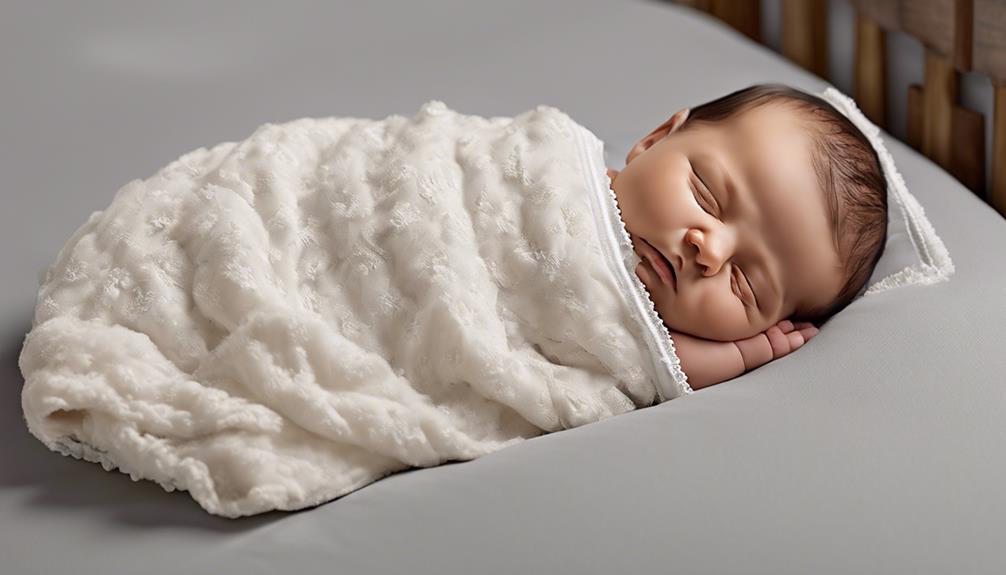As we navigate the world of newborn sleep habits, it's intriguing to explore the subtle cues our little ones give us. Have you ever noticed your baby finding solace in sleeping on their stomach? There may be more to this preference than meets the eye.
A combination of factors could be at play, shaping your baby's choice of sleep position. Let's uncover the mysteries behind why your newborn gravitates towards snoozing on their tummy and what it might signify for their restful slumber.
Key Takeaways
- Stomach sleeping provides comfort and security similar to the womb environment.
- It aids in digestion, soothes colic, and promotes relaxation for newborns.
- Mimicking the fetal position, it enhances sleep quality and breathing.
- Acknowledging and respecting each baby's preference for stomach sleeping is essential for their well-being.
Comfort and Security
When newborns sleep on their stomach, it's often because they seek comfort and security in the cozy sensation it provides. The feeling of being nestled in this position can remind babies of the snug environment they experienced in the womb. The gentle pressure on their tummy during stomach sleeping can create a sense of familiarity and reassurance, helping them feel more settled and at ease.
For many newborns, stomach sleeping offers a level of closeness and containment that promotes relaxation. This positioning can evoke a sense of being held and supported, leading to a calmer state during sleep. The comforting embrace provided by stomach sleeping may be why some babies naturally gravitate towards this position for restful slumber.
Understanding the innate desire for comfort and security that stomach sleeping fulfills for newborns can help caregivers create a nurturing sleep environment that meets their little one's needs. By ensuring safe sleep practices while acknowledging the appeal of this position, caregivers can support their baby's journey to peaceful and restorative sleep.
Digestive Relief

To help alleviate digestive discomfort or gas issues, some newborns may find relief by sleeping on their stomach. Here are three reasons why stomach sleeping can be beneficial for newborns struggling with digestive problems:
- Pressure on the Stomach:
Sleeping on their stomach applies gentle pressure to the baby's abdomen, which can aid in digestion for some newborns. This pressure may help move trapped gas along and provide relief from discomfort.
- Soothing for Colic:
Newborns who experience colic or gas issues may find sleeping on their stomach soothing. The position can help calm their digestive system and alleviate some of the symptoms associated with colic, leading to a more restful sleep.
- Consulting a Pediatrician:
To consult with a pediatrician if your newborn consistently prefers sleeping on their stomach for digestive relief. A healthcare provider can offer guidance on safe sleeping practices and make sure that your baby's sleeping position is suitable for their individual needs.
Mimicking Womb Position

Acknowledging that newborns sleeping on their stomach may seem concerning, but recognizing that this position can offer womb-like comfort to babies.
The natural instinct for babies to curl up in a fetal position is often mirrored when they sleep on their stomach.
This soothing and familiar position can help newborns feel secure and regulated, reminiscent of their time in the womb.
Womb-Like Comfort
Incorporating elements of the womb environment, newborns may find stomach sleeping to offer a sense of womb-like comfort and security. Here are three reasons why this position can be soothing for your little one:
- Mirroring the Womb: The curled-up posture while sleeping on their stomach can replicate the fetal position, promoting relaxation and a feeling of security akin to being in the womb.
- Pressure and Confinement: The gentle pressure on their abdomen during stomach sleeping can remind newborns of the snugness and confinement they experienced in the womb, providing a sense of comfort.
- Coziness and Sleep Quality: The enveloping sensation and cozy environment created by stomach sleeping can contribute to improved sleep quality and duration for newborns, helping them feel settled and content.
Natural Instinct
Mimicking the natural fetal position in the womb, newborns often instinctively gravitate towards sleeping on their stomach. This curled position provides a sense of security and comfort that babies are familiar with from their time in the womb.
Stomach sleeping can help newborns feel more settled and relaxed during sleep, recreating the snug feeling of being in utero. The pressure on their stomach and chest while sleeping on their front can also be soothing for some babies.
It's amazing how their natural instinct leads them to find solace in a position that reminds them of the safety and warmth they experienced before entering the world.
Soothing Familiar Position
Taking a cue from their time in the womb, newborns often find comfort and security in the familiar position of sleeping on their stomach. Here are three reasons why stomach sleeping can be soothing for your little one:
- Recreating the Womb Environment: Stomach sleeping mirrors the cozy, curled-up position babies experienced in the womb, providing a sense of familiarity and warmth.
- Promoting Calmness and Safety: The snug feeling of stomach sleeping can help newborns relax and feel secure, as it replicates the confined space they were accustomed to before birth.
- Embracing the Familiar: By sleeping on their stomach, babies may find solace in a position that reminds them of their time in the womb, promoting a peaceful and settling sleep environment.
Reduced Startle Reflex

For newborns, the reduced startle reflex can play a significant role in their preference for sleeping on their stomachs. The startle reflex, also known as the Moro reflex, is a natural response for babies when they feel a sudden movement or noise, causing them to startle and wake up. Sleeping on their stomachs can help dampen this reflex, providing a sense of security and comfort that allows them to settle into sleep more easily.
The pressure on their tummy while in this position mimics the feeling of being held, creating a calming and soothing environment for the newborn. This calming effect can lead to deeper sleep for some babies, resulting in longer and more restful periods of rest. Babies who startle easily may find stomach sleeping particularly beneficial as it helps them feel more stable and secure.
Understanding your newborn's preference for stomach sleeping in relation to their startle reflex can help you create a sleep environment that promotes their comfort and well-being.
Enhanced Breathing

Enhancing newborns' breathing patterns can be facilitated by sleeping on their stomachs, which may help improve airflow and oxygen intake during sleep. This position can have various benefits for your baby's respiratory health:
- Improved Airflow: Stomach sleeping can open up the airways, making it easier for some newborns to breathe, especially if they've issues with nasal congestion. This enhanced airflow can promote better breathing patterns while your little one rests peacefully.
- Best Oxygen Intake: The head position while sleeping on the stomach can aid in better oxygen intake for certain infants. This can be particularly helpful for babies who may struggle with maintaining steady breathing patterns during sleep.
- Restful Sleep: When newborns experience enhanced breathing while sleeping on their stomachs, it can lead to a more restful sleep. This restfulness is essential for your baby's overall well-being and development.
Improved Sleep Quality

Improved sleep quality for newborns is essential for their overall well-being and development. Stomach sleeping can offer several benefits that contribute to this improved quality of sleep.
Some newborns may experience longer sleep cycles when they sleep on their stomachs, allowing for more restorative rest. The sense of comfort and security provided by this position can help certain babies relax and settle into sleep more easily.
Pre-term babies, who often struggle with sleep patterns, may find that stomach sleeping improves their overall sleep quality. For infants dealing with reflux or gas discomfort, sleeping on their stomach can provide relief and enhance their ability to sleep peacefully.
Personal Preference

As caregivers, we grasp the importance of considering our baby's comfort preferences when it comes to sleep.
Some infants naturally find stomach sleeping more soothing and calming, leading to longer and more restful sleep cycles.
The gentle tummy contact can provide a sense of security for babies, especially pre-term infants, making stomach sleeping a preferred choice for some little ones.
Baby's Comfort Preference
Some newborns naturally gravitate towards sleeping on their stomach due to their personal comfort preferences. It's crucial to understand that each baby is unique, and what brings comfort to one mightn't suit another.
Here are some reasons why your baby might prefer sleeping on their stomach:
- Feeling Secure: The coziness and security of stomach sleeping can mimic the snug sensation of being in the womb, providing comfort to certain newborns.
- Cozy Positioning: The curled-up position while sleeping on the stomach can feel more comforting for babies who enjoy a snug sleeping posture.
- Soothing Sensations: Some newborns may find the gentle pressure on their tummy during stomach sleeping calming and soothing.
Understanding your baby's comfort preferences can help you create a safe and nurturing sleep environment for them.
Natural Sleep Position
Understanding why newborns naturally prefer sleeping on their stomachs can provide insight into their personal sleep preferences and comfort needs. For some newborns, the act of sleeping on their stomach provides a sense of security and coziness, as it mimics the position they held in the womb.
The gentle pressure on the stomach while in this position can have soothing effects, helping babies relax and settle into longer sleep cycles with deeper rest. Recognize that each infant is unique in their sleeping habits, and for some, finding comfort in stomach sleeping is a natural inclination that fosters a peaceful slumber.
Soothing Tummy Contact
In exploring the preference newborns exhibit for sleeping on their stomachs, one can't overlook the significance of soothing tummy contact as a key factor. Here are three reasons why some newborns find comfort and relaxation in stomach sleeping:
- Pressure and Security: The gentle pressure on the tummy while sleeping can create a sense of security and relaxation for certain newborns, making them feel safe and content.
- Mimicking Cuddling: The sensation of being on their stomach can mimic the feeling of being held or cuddled, providing a familiar and comforting experience for babies who enjoy this position.
- Personal Preference: Personal preference plays a significant role in why some newborns naturally gravitate towards stomach sleeping, as they find it conducive to achieving a sound sleep that leaves them feeling rested and refreshed.
Frequently Asked Questions
Why Does My Newborn Like to Sleep on His Stomach?
I acknowledge your concern. Stomach sleeping can provide newborns a sense of security, mimicking the womb's coziness. It may help with reflux, aid digestion, and offer longer, more restful sleep. Always prioritize safe sleep practices and consult your pediatrician.
Why Does My Baby Always Want to Be on His Stomach?
We get your concern about your baby always wanting to be on their stomach. Babies may seek this position for comfort, warmth, and security. It's important to guarantee safe sleep practices while respecting your little one's preferences.
Can Babies Sleep on Their Stomach if They Roll Over?
Yes, babies can sleep on their stomach if they roll over. Once they master this milestone, they can choose their comfy sleep position. Supervise to make sure safe sleep practices. Rolling over is a sign of growing independence.
Can a Newborn Sleep on Their Stomach on My Chest?
We acknowledge the desire for closeness when wondering if a newborn can sleep on your chest. While it can offer comfort and warmth, it's important to remember safe sleep guidelines. Direct supervision is essential for this practice.
Conclusion
To sum up, while newborns may find comfort and security in sleeping on their stomachs, it's important to prioritize safety and follow recommended sleep practices.
Did you know that according to the American Academy of Pediatrics, placing babies on their backs to sleep reduces the risk of SIDS by 50%?
By staying informed and practicing safe sleep habits, we can guarantee our little ones rest peacefully and safely.









